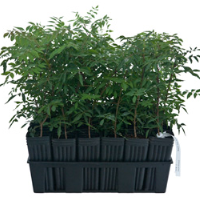2 Million Pistachio Trees at Risk from Strange Disorder
 UCB-1 pistachio rootstock (photo: Duarte Nursery)
UCB-1 pistachio rootstock (photo: Duarte Nursery)
An estimated 2 million pistachio trees on 20,000 acres in the San Joaquin Valley may be affected by a serious disorder traced to a single nursery in Stanislaus County, that has growers debating whether the problem at its core is bacterial or genetic.
The California Department of Food and Agriculture (CDFA) confirmed in April 2014 that the plant pathogen Rhodococcus fascians was present in several orchards and the pistachio trees were doing poorly. The owner of the nursery that sold the tree rootstock to growers told the Visalia Times-Delta that the company had already reached legal agreements with some of them, but negotiations with others, some of a hostile nature, continue.
The bacteria causes stunted tree growth and bushy tops (also called witches’ broom), and can spread. It is known as Bushy Top Syndrome. The trees don’t root very well and most don’t bud.
Farmers started ripping up their stocks, hoping that something evil wasn’t being left behind in the soil, lurking on farm implements or floating through the air. But the Times-Delta said that farmers weren’t told that Stanislaus County-based Duarte Nursery was probably the sole source of the problem until last month.
Nursery owner John Duarte questions whether the problem is bacterial. “If it is—it’s the strangest disease I’ve ever seen,” he said. He suspects it’s a mutation in the genes.
The nursery may be the largest permanent crop nursery in the country, according to the Central Valley Business Journal, and all of its offerings—pistachio, almond and walnut clonal rootstocks are top sellers—use cloning. Clonal rootstocks are not Genetically Manipulated Organisms (GMOs).
Reporter Patricia Reynolds put it this way:
“If you enjoy sipping a class of chardonnay while munching on a handful of almonds, your beverage and snack very likely started out as plant tissue cultivated and nurtured in a laboratory in Stanislaus County.
The Modesto Bee reported that Duarte said the bacteria has not been found at the nursery, which would tend to eliminate that as a source. But the CDFA seemed to indicate otherwise in a review of the bacteria’s rating in light of the pistachio problem. The department cited a scientific report that “confirmed identification of the plant pathogen, Rhodococcus fascians, associated with abnormal pistachio UCB-1 rootstocks from several orchards in California, as well as from a California nursery in Stanislaus County where the rootstocks had originated.”
Pistachio trees take years to produce nuts and the affected trees were sold beginning in 2011. Reports of problems with the trees surfaced in 2013, according to the CDFA. Kings County grower Chuck Nichols told the Times-Delta he ripped up 75 of his affected 300 acres and has been talking to Duarte for a year about compensation. Nichols said he knew of six lawsuits pending against the nursery.
Pistachios have become a huge crop for farmers in recent years, enormously lucrative and very controversial. Ninety-eight percent of all U.S. pistachios come from the region’s 225,000 planted acres and would be the poster tree for water-sucking nuts in a drought if almonds weren’t so much worse. It takes 0.75 gallons of water to grow one pistachio, compared to 1.1 gallons for an almond.
Pistachios were only grown on 1,700 acres in 1977, but like almonds, they have become automated cash machines. Production has flourished under the guidance of giant agribusiness and its connections to water. Duarte reportedly handles about 70% of the pistachio market for new trees.
Duarte Nursery suspended their clonal pistachio sales for the duration of 2015.
–Ken Broder
To Learn More:
20,000 Acres of Pistachio Trees at Risk (by John Lindt, Visalia Times-Delta)
Hughson Nursery Deals with Problem Pistachio Trees (by John Holland, Modesto Bee)
Duarte Trees and Vines Leads Cutting Edge Cloning Technology (by Patricia Reynolds, Central Valley Business Journal)
California Pest Rating Proposal: Rhodococcus Fascians (California Department of Food and Agriculture)
- Top Stories
- Controversies
- Where is the Money Going?
- California and the Nation
- Appointments and Resignations
- Unusual News
- Latest News
- California Forbids U.S. Immigration Agents from Pretending to be Police
- California Lawmakers Urged to Strip “Self-Dealing” Tax Board of Its Duties
- Big Oil’s Grip on California
- Santa Cruz Police See Homeland Security Betrayal in Use of Gang Roundup as Cover for Immigration Raid
- Oil Companies Face Deadline to Stop Polluting California Groundwater





